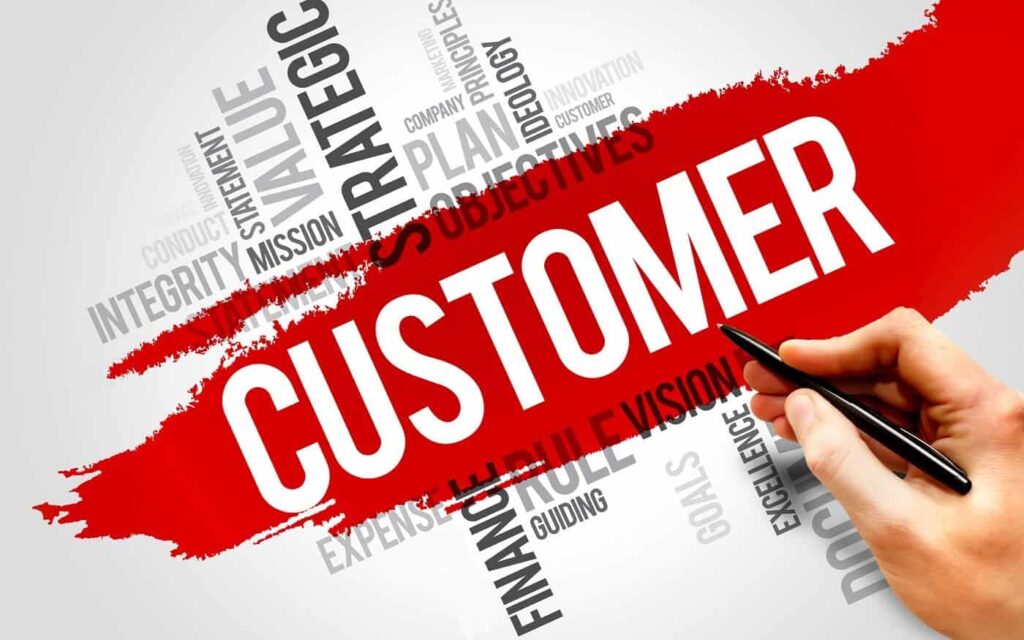How to make your customers feel welcome and valued.
You need to continue expanding your business. A customer in a business situation remains a customer even after he or she has made the purchase.
This is the reason for the saying it is key to appreciate each and every customer as if they are important and they came to your office for you to show them your appreciation and to consider they valued to purchase from you. Showing your appreciation doesn’t have to be extravagant. It may be just little things, like thanking them for waiting, thanking them for whatever it is that they’ve just done to support you. Even the feedback you give. You could write a handwritten note. You could thank them personally.
These are just a few of the ways you can keep the client returning to your business and can demonstrate that they are being taken cared of. There are many ways to deliver simply good customer service, but there are also ways to create a connection with people that will make them want to come back to you in the future.
This article explains the importance of making customers feel valued.
Its not easy, especially if you’re a server or a retail worker. There isn’t a secret of just providing cheap deals on quality products. To satisfy your customers you really need to make them feel valued. You have to consider what they would have seen had they bought it. You are looking at things from their point of view. Are you providing the perfect customer service experience? Are you doing all you can to help them? Are you making them feel welcomed?
According to most research, customers don’t express value and satisfaction. And satisfaction is not a permanent factor. Satisfied customers may not return, they go to the competition. 96% of customers don’t actually complain they will stop using your services as dead. Because of this it’s important to make your customers feel valued from the get go. Most of the comments on the feedback sites are negative because in most cases there is some reason to complain; if you have had a good service or a good product, there is little rewarding milestone to comment online in a world where no long weekday afternoon shopping sprees are likely to take place.
Many times the good feedback never gets to us to realise how you can increase your customers experience. Help with the conversions by making them feel valued. Help with on demand customer service as their priorities. Make them feel like a VIP. If you can get by with it, you can also incentivise loyalty for your customers who do shop with you. Make sure that you offer them more. Help them with a customer satisfaction or appreciation card. It could be a rewards card where they get a little bit of the leftover, like when they buy your product over a certain amount, maybe they get a discount.
The first step in helping your customers feel valued genuinely thank them. Showing genuine appreciation is important to move mountains for your relationship with your customer. You may be a small business and call every single customer every day of the year and say thank you for doing business with us. If you’re a bigger company perhaps you’ve got thank you campaign for similar reasons. Whatever the way that you do it genuinely thank your customers.
The second step is to give personal attention. Nothing says that you’re a VIP until you treat someone individually. You look at their needs and you roll out the red carpet for them. If you’re thinking about selling something, you don’t want to choke your customer or client, so don’t be too aggressive about seeing them.
Let them be but when you do deal with them, make them feel like they are the most important. Don’t bombard them with emails or calls so they feel overwhelmed. Take the pressure off of them and help them realise you’re there for them. Finding the right balance is important. Knowing what you can do for your customers without pushing them too far. Call them by name and let them know that they are first on your list. This will help them feel valued and help them do repeat business with you.
Another step is to Acknowledge feedback. When customers give you feedback, they’re actively telling you how you can improve. Hear them recast and ask for clarifications, check back with them to be sure you are actually doing something to make your firm better because they said so. In fact, you could bring them back and have them evaluate the course changes you have made in response.
Next step is to make sure you offer quick responses. In today’s world, people want things immediately. We know so much that everything we want can come immediately. Everything gets faster. If people reach out to you on the phone, via email, or on a website, make sure to reply to them quickly. Quickly getting back to them can reinforce that their responses mean something to your business.
Next step is to always listen and then remember. This keeps the people engaged with you; also earns you their affection and loyalty. You also get people to like you and start trusting you more if you also act like you found the things they were saying interesting, so ask questions that are relevant and then brainstorm with them, but also once those things have come up, is to remember them … remembering what it is that they’ve told you, it shows to them the things that they’ve said you that they consider important are also important to you. And they are important.
This is one of the most important steps, telling them the truth.
Your company may make one or two mistakes and you think that if you lie to them for a certain amount of time you can avoid certain problems. But you can never really get accused of being too honest. It is important to have that trust and as a foundation for our business.
When we deal with issues, truth telling is all we have to work with in dealing with those issues and to make the best possible decisions with those outcomes in view. You say truth to him, good or bad, that’s how you create a relationship with a customer. That’s how you build a customer.
This next step is consistency. Someone who is new or a repeat customer or even brought in by someone you know. Give your customers a great experience from the start and do it every single time. If they get a really good experience once, they’ll come back and then they come back a second time and the second or third time the experience is a huge let down. Increasing your customer lifetime value is vital. And so looking at consistency is key to doing this.
Treat them like the hero of the story.
Whenever you tell a story. Or whenever you set an expectation. Or whenever you’re describing a benefit of your product, Whatever it is, put the customer at the centre of the story as a hero of that story. Help them see the benefits available to them and create value that you See as value know your customer should be the most important part of the transaction and everything else revolves around them, treat them like a superhero or a VIP.
Next step is just to be presentable. Always be presentable. For a retail job, it’s to get the doors open and your store looking the best that it can to look your best, to be professional, your clothing to be appropriate. And if you run an online business, that means your website and your mobile app is running and being updated. Make sure that everything is presentable and perfect from the customer’s perspective and viewpoint.
Final thoughts: Making your customers happy is a thinking and effort on your part that customer is the life force of your organisation without that life force you can’t have a organisation. Hence, assuring that each of the above accountants operate successfully can improve your chances of having a longstanding customer. It’s not even about customer service anymore, it was about developing relationships of trust, talking to people, engaging with people, making sure that they felt that they were not simply a sale.

David Alssema is a Body Language Expert and Motivational Speaker. As a performer in the personal development industry in Australia he has introduced and created new ways to inspire, motivate and develop individuals.
David Alssema started his training career with companies such as Telstra and Optus Communications, and then developed Neuro-Linguistic Programming (NLP) within workplace training as principal of Paramount Training & Development.
As an author/media consultant on body language and professional development David has influenced workplaces across Australia. He contributes to Media such as The West Australian, ABC Radio, Australian Magazines and other Australia Media Sources.





